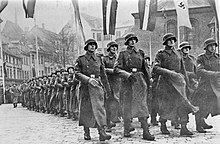Latvian Legion
[8] The Latvian Legion was created in January 1943 on the orders of Adolf Hitler following a request by Heinrich Himmler, head of the SS.
The initial core of the force was populated by Latvian Police Battalions, which were formed starting in 1941 for security duties and already serving on the Eastern Front under Wehrmacht command.
[11] One month after the unit was founded, German occupation authorities in Latvia started conscripting military-age men specifically for the Legion.
[6] Unlike in Lithuania, potential legionary recruits in Latvia did not organize an official boycott of conscription; some Latvians deserted however rather than serve in the Nazi war effort.
By June 26 there were 7,671 ethnic Russians from Latvia's Latgale, representing ten percent of men from the region, serving in various units of the Latvian Legion.
During the third battle in December 1944, the opposing Soviet units included two Latvian divisions, the 43rd and the 308th, formed from recruits drafted in Soviet-occupied Eastern Latvia.
Conscripts promised in the name of God to be subservient to the German military and its commander Adolf Hitler, to be courageous and to be prepared to give up their life "in the fight against Bolshevism".
[6] The Allies confirmed this as early as 1943, when a British investigative mission found Latvians stood against both their Soviet and German occupiers.
These hopes were bolstered by Allied communications received in November 1944 in which British command instructed them to hold Courland until a joint British-American fleet entered the Baltic.
[24] Subsequently, on 13 April 1950, a message from the Allied High Commission (HICOG), signed by John J. McCloy to the Secretary of State, clarified the US position on the Baltic Legions: "they were not to be seen as 'movements', 'volunteer', or 'SS'.
[6][27] During the Soviet period, the Latvian Legion were described as having been illegally conscripted by Nazi Germany in 1943, with no indication of being war criminals or of Holocaust involvement.
[28] For example, the Soviet film I Remember Everything, Richard (also known as Rock and Splinters in its uncut release) made during the 1960s (during the Cold War) at the Riga Film Studio, while being full of Soviet propaganda clichés, clearly illustrates recognition of several essential aspects with respect to Legion soldiers, amongst those: that they were front-line soldiers, they were mostly forcefully conscripted, they were not supporters of Nazi ideology, they did not take part in the Holocaust.
Both the King and the Minister for Foreign affairs expressed their regret for Sweden's past extradition of Baltic Legion soldiers to the Soviet Union.
[35][30] This is now strongly disputed by Vince Hunt in his book The Road of Slaughter; The Latvian 15th SS Division in Pomerania, January-March 1945 based on interviews with officers and soldiers present.
[39] On 21 February 2012, the Council of Europe's Commission against Racism and Intolerance published its report on Latvia (fourth monitoring cycle), in which it condemned commemorations of persons who fought in the Waffen SS and collaborated with the Nazis.
[40] ECRI expressed concerns as regards to the authorisation of a gathering, commemorating soldiers who had fought in a Latvian unit of the Waffen SS, that takes place every year on 16 March and is held in the centre of Riga, and expressed dismay at the authorisation by the competent courts of an event set to celebrate the Nazi occupation of Riga (on 1 July).
[42] ECRI recommended, that "the Latvian authorities condemn all attempts to commemorate persons who fought in the Waffen SS and collaborated with the Nazis.
"[43] On 13 March 2014, UK Labour MEP Richard Howitt, a spokesperson for the European Parliament Human Rights Sub-Committee issued a statement that included the view that "Whether local boys were forced to don the SS uniforms or were eager volunteers, celebration of their actions not only insults the memory of the victims but also honours Nazism itself.
"[44] On his own website, Howitt, citing the Waffen SS marches, criticized the Conservative Party for its alliance with nationalist elements in the Latvian government.




